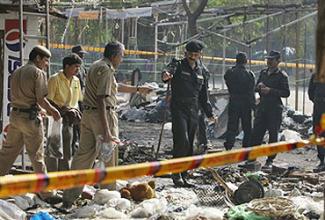Delhi Blasts: Terrorism Unmasked on Black Saturday
More than 60 people were killed and over 200 injured in one of the bloodiest-ever terrorist attacks that shook New Delhi with three synchronized explosions on October 29. The first blast occurred in the evening at 5.38 p.m. outside a Jewelers shop in the Paharganj area, close to Delhi’s main railway station. At 5.52 p.m., a bag was spotted inside a public transport bus in Govindpuri, which exploded when thrown out. A powerful explosion hit Sarojini Nagar’s crowded mini market at 5.56 p.m. The timing and the locations give enough indications of the involvement of terrorist outfits in these coordinated attacks.
The official sources have confirmed that improvised explosive devices (IEDs) were used by the terrorist groups. The Delhi Police, who has already unleashed a massive manhunt, has confirmed the use of electronic timer device in these blasts.
The Islamic Inquilabi Muhaz (IIM), a less familiar name, has taken responsibility for these blasts. However, IIM is not that unknown and there is enough evidence to suggest that it is nothing but a frontal organization of Lashkar-e-Toiba (LeT). In fact, when LeT first put its foot on Indian soil in 1993 it was in the guise of IIM. It’s an established practice with Lashkar that once it manages to strike outside Kashmir or hit majority of civilians; one rather dormant group comes up and takes the responsibility. This is because it doesn’t want to loose its self proclaimed credential of waging a freedom struggle in Jammu and Kashmir.
As of now, LeT is the deadliest terrorist organization in India who has successfully built up modules in all Indian states which has a substantial Muslim population. The manner in which the whole terrorist game plan of serial blasts was executed, all fingers are pointed towards the proscribed LeT. Though, it’s too early to draw any conclusion yet there are several possibilities which suggest a clear hand of the Lashkar militants in these attacks. The ‘Black Saturday’ was the day when a city court was to pronounce sentence on the case of Red Fort blast where the LeT militant Mohammed Asfaque along with seven others have been convicted earlier this month. These blasts could be a message on that. It is a known fact that LeT is running a number of terrorist training camps in Pakistan Occupied Kashmir (PoK) and there are reports that most of these camps had to sustain several damage in the October 8 earthquake. This attack is also being viewed, as a message from the terrorist outfit that its resources and its ability to strike are intact.
The problem of terrorism is not new for India though. It has been forced to fight the problem of insurgency and terrorism since its independence. Over 50,000 have died in different terrorist related violence since 1994.
Following Delhi blasts, the Indian Prime Minister Manmohan Singh said expressing his shock and distress: “The target is clearly innocent citizens. Efforts to spread chaos and disturb peace will not be allowed to succeed at any cost. The government is determined to defeat nefarious designs of terrorist elements.” This strong statement from the head of the government highlights the determination of Indian nation state to put brave fight against terrorism. World leaders too have condemned the blasts with UN Secretary-General Kofi Annan said he was appalled and shocked at this terrorist outrage. The European Union said that terrorism is an aggression against universal values that we share without distinction of language, culture, or religion. The US denounced the blasts as a cowardly act of violence, while British Foreign Minister Jack Straw said the blasts were yet another example of terrorists' cynical and callous disregard for human life.
In this lonely war against terrorism; enough has been lost, maximum sacrifices have been made and what we need today is a firm systematic approach. What is needed is the immediate replacement of the existing soft counter terrorism infrastructures with world-class law and order, intelligence and anti terror agencies. At the same time, India must work strategically to make a strong case against Pakistani patronage of terrorism in India to ensure international pressure on Pakistan. New Delhi must convey the strongest message to the world community that peace cannot be a one-way process.
Moreover, India needs to develop a proper intelligence mechanism to deal with such acts of terrorism. In this particular case of Delhi serial blasts, there are reports from several quarters that the security agencies were sounded with the possibility of a terrorist attack during the festival season. Undoubtedly, it is a difficult rather impossible task to accurately predict terrorist attacks, but a proper coordination among various security agencies would minimize the extent of such attacks to the maximum.
